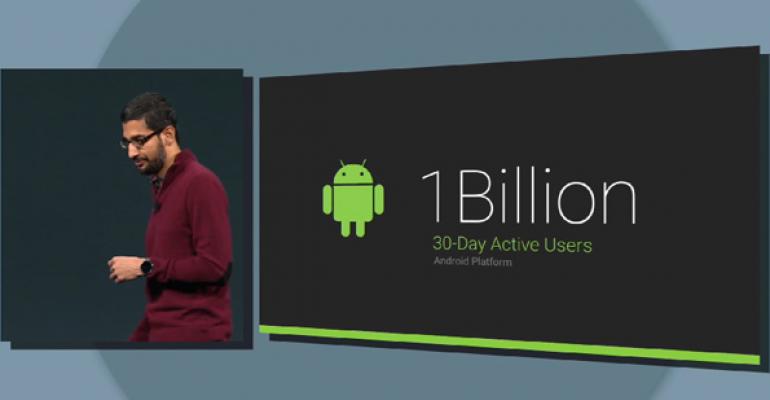At the keynote address for its Google I/O conference on Wednesday, executives from the search giant laid out a plan by which its Android mobile OS will be used at the heart of devices big and small, and will infiltrate our lives in ever-pervasive ways. This year's show represented a flexing of Google's market power muscles, and the firm barely even mentioned Microsoft, which at one time pushed a similar sweeping vision for its own platforms.
But anyone who is pining for the days of "Windows everywhere" or Microsoft's "three screens and a cloud" mantra should be shocked by the sheer scope of Google's ambitions. This company is ensuring that its technologies—mostly Android-based—will be there with us no matter where we are: At home, out and about, in a car, or whatever, and in our glasses, on our wrists, in our phones and tablets, and in our TVs and other screens. Maybe it's' time for "Android everywhere."
Google I/O is ostensibly a conference for developers, and Google pointed out that 6,000 of those developers showed up onsite in San Francisco to learn more. But as with Apple's similar WWDC event, this is really about pushing platforms to the world, not just to developers, and millions of people watched the Wednesday keynote address live online.
What they saw was in many ways breathtaking. Android now claims over 1 billion active users, and is quickly closing in on Windows as the most-often-used technology platform on earth. It controls over 80 percent of the smart phone market and over 62 percent of the tablet market and is still gaining share in each every year.
And now Google is expanding Android's mission yet again. Android will be in low-end smart phones in the same emerging markets that Microsoft is trying to ply with the AOSP-based Nokia X line. It will be made secure to comply with enterprise needs, and offer a separation of work and personal data and apps, something not offered on other platforms. It could overtake both the PC and gaming consoles this year in graphics performance.
More aggressively, Android will be used as the basis for new wearable platforms that will include glasses, watches, wristbands and other devices. It will be placed in new smart TVs while the inexpensive Chromecast device continues to serve non-Android-based sets. It will be added to Chrome OS so that users of low-end Chromebook laptops can run Android phone apps. It will be in fitness trackers, via Google Fit. And it will be in automobiles, courtesy of Android Auto, an initiative supported by dozens of major carmakers.
These changes will be facilitated by the biggest Android update ever. Currently dubbed Android L, but most likely to be launched as Android 5.0 later this year, this new Android version includes a Windows Phone-inspired user experience called Material that introduces clean grid design, bold colors, and animations. (Material will be used on the web and in Chrome OS as well, Google says.)
As for Microsoft, the software giant was decidedly treated as an afterthought by dismissive Google executives. The firm referenced "Office" a few time as if it were a legacy set of document formats that would be blown away by its Google Docs-based apps and services. And in Google's vision of productivity, Android, Chromebooks and Google Drive would work in concert to eliminate the need for legacy Windows systems.
Google isn't really a major force with Microsoft's core business audience, but it is indeed a huge threat in three key areas, all of which speak to the future: Individuals/consumers, education and small business startups. None of these customer groups see much need for on-site infrastructure, complex and expensive software services, or traditional computing devices. And each is more likely to "go Google," as the firm says, than stick with the Microsoft past.
And that is the troubling bit here. Unlike Apple's "Baghdad Bob"-like histrionic claims at its own events, Google's numbers are worth watching, and don't need to be cherry-picked to make the platforms look successful. This firm is still on the way up, even though it dominates all of its core markets. And there is no end in sight: Google, perhaps alone in the tech industry, can deliver on a vision of pervasive computing services that touch us everywhere in life. And the company appears hell-bent on making that happen.





